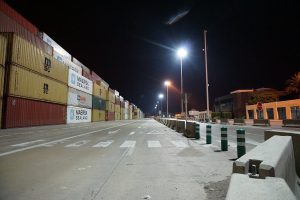
- This decrease will occur in a period in which, according to the PAV Business Plan, traffic is expected to rise by 19%.
- The institution is working on the progressive decarbonization of its processes to help mitigate climate change.
- The port of Valencia plans to reduce by 4.5 million kWh and 1 million diesel liters by 2020.
Valencia, June the 5th 2017. – The Port Authority of Valencia is committed to the progressive decarbonization of the activities carried out in the port areas it manages (Valencia, Sagunto and Gandia). Within this scope, the PAV has defined, within its environmental and energy policy approved in 2016, as one of its strategic objectives the reduction of the impact of port activity to collaborate in mitigating the effects of climate change. Specifically, the PAV plans to reduce its Carbon Footprint by 4% between the years 2015-2020. According to the Business Plan, the traffic is expected to increase by 19% in this period.
To achieve this decrease, the PAV has initiated the implementation of measures to reduce emissions from fossil fuels and to promote energy efficiency in ports. To this end, the Port Authority of Valencia has an Emission Reduction Plan for the Port of Valencia, prepared under the Sea Terminals project, which aims to reduce the electrical consumption of the area by 4.5 million kWh and reduce diesel consumption in 1 million liters by 2020.
In order to reach these figures, the Emission Reduction Plan of the port of Valencia includes concrete measures such as the reduction of the fleet vehicles service and their progressive replacement by hybrid or electric vehicles. To date, the PAV has purchased two electric vehicles and has installed two electric charging points in the port of Valencia. It is also planned the progressive replacement of existing lighting systems by LED lamps as well as the replacement of the cranes luminaires by this type of technology.
With regard to fuels, the Plan also contemplates the use of low carbon fuels by vessels used by nautical services, such as tugboats and the motorization of terminal yard machinery with more efficient engines and a higher degree of electrification. Likewise, the PAV is working for the progressive introduction of renewable energies in the port area of Valencia.
Environment
The Port Authority of Valencia has been established as a European reference in environmental management in the port area. In this sense, it has the most demanding environmental certifications such as the European Environmental Port Certificate PERS (Port Environmental Review System), ISO 14001 and the European Eco-Management and Audit Scheme (EMAS III), the most prestigious certification at the European level. In addition, the PAV also has the ISO 50001 Energy Management certification.

